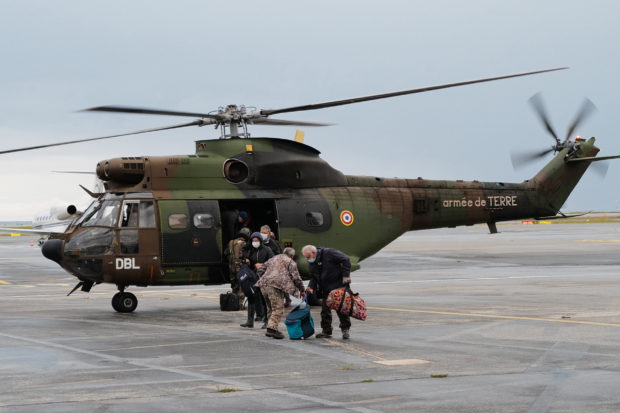
Inhabitants of Saint-Martin-de-Vesubie disembark from an “Armee de Terre” helicopter at Nice airport, in southern France on October 4, 2020, after extensive flooding caused widespread damage in the Alpes-Maritimes departement. – French and Italian rescue services stepped up their search efforts after floods cut off several villages near the two countries’ border, causing widespread damage and killing two people in Italy. Eight people remained unaccounted for on the French side of the border after storms, torrential rain and flash floods battered the area, washing away roads and houses, cutting off entire villages and triggering landslips. (Photo by Valery HACHE / AFP)
Saint-Martin-Vesubie, France – French and Italian rescue services stepped up search efforts Sunday after floods cut off several villages in the mountainous border regions, causing widespread damage and killing at least four people.
Others remained unaccounted for on the French side of the border after storms, torrential rain and flash floods battered the area, washing away roads and houses, cutting off entire villages and triggering landslips.
Emergency services recovered at least four bodies Sunday on the Mediterranean coast of Liguria, Italy, ANSA news agency and other Italian media reported.
Italian and French teams were working together to try to identify them, but it was not yet clear that they were victims of the flooding or if their deaths had another cause.
French rescue workers are still looking for eight people listed as missing, after people saw them swept away in the flood waters. Another 12 people are also unaccounted for.
In Breil-sur-Roya, a French village close to the Italian border, houses were buried in mud and turned-over cars were stuck in the riverbed.
Rescue efforts were concentrated on the Roya valley where roughly 1,000 firefighters, backed by helicopters and the army, resumed their search for survivors and helped people whose homes were destroyed or inaccessible.
Storm Alex barrelled into France’s west coast on Thursday, bringing powerful winds and rain across the country before moving into northern Italy.
“What we are going through is extraordinary,” said Bernard Gonzalez, prefect of the Alpes-Maritimes region, after as much as 60 centimetres (two feet) of rain fell in 24 hours in the worst-affected areas.
Italy confirmed two people died Saturday, a volunteer firefighter on a rescue operation and a man whose car was washed away.
France also announced two fatalities. The first found was a shepherd whose body was pulled from a river near the border. Firefighters later announced a man had been found dead in his car in the southeastern village of Saint-Martin-Vesubie.
France has declared the region a natural disaster zone.
Saint-Martin-Vesubie, a village home to 1,400 north of Nice, was completely cut off by the storm.
A bedraggled group of tourists and residents gathered in the village square to be airlifted to safety, an AFPTV journalist said after reaching the site on foot.
“My three-storey house, it’s in the river,” said villager Sandra Dzidt, 62, who had to flee the floods dressed only in her nightgown. “All I have left is a tiny piece of wall and a door.”
Across the region, emergency crews were handing out food and airlifting thousands of bottles of water into remote villages cut off by the storms.
– ‘Helicopter procession’ –
French Prime Minister Jean Castex inspected the damage by helicopter on Saturday, saying he feared the number of people missing could rise after dozens of cars and several houses were swept away in apocalyptic scenes.
Gonzalez called on the families of the missing not to give up hope.
“Just because their loved ones haven’t been able to get in touch doesn’t mean that they have been taken by the storm,” he said.
Many landline and some mobile phone services were disrupted, with some villages using satellite phones to communicate with rescue services.
Despite forecasts of more rain, rescue efforts were to continue throughout Sunday, Gonzalez said.
“The helicopter procession will continue all day long,” he said.
The presidents of Italy’s Piedmont and Liguria regions signed a joint letter calling on the government to declare a state of emergency with several villages cut off.
“The situation is very serious. It is like it was in 1994,” when 70 died after the Po and Tarano rivers flooded, Piedmont’s president, Alberto Cirio, told La Stampa newspaper.
“The difference being 630 mm of water fell in 24 hours — unprecedented in such a small timeframe since 1954.”
Cirio added Italy was already struggling to cope with the effects of the coronavirus which has left some 36,000 dead and shattered the economy over the past six months.
“We are already in an extraordinary situation. Because of the pandemic the region will this year receive 200 million euros less in tax receipts. If the state does not intervene (with rescue funding) we shall not recover.”